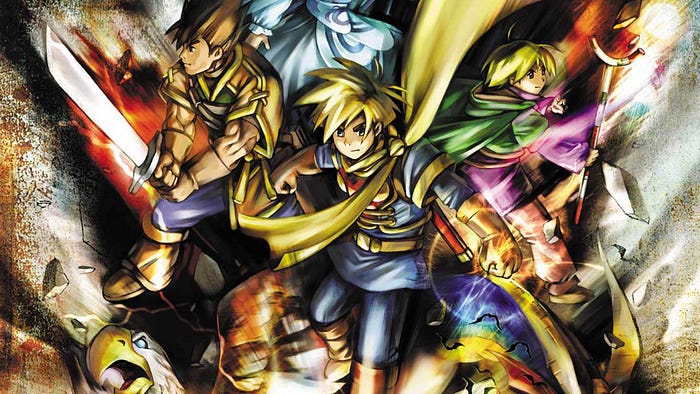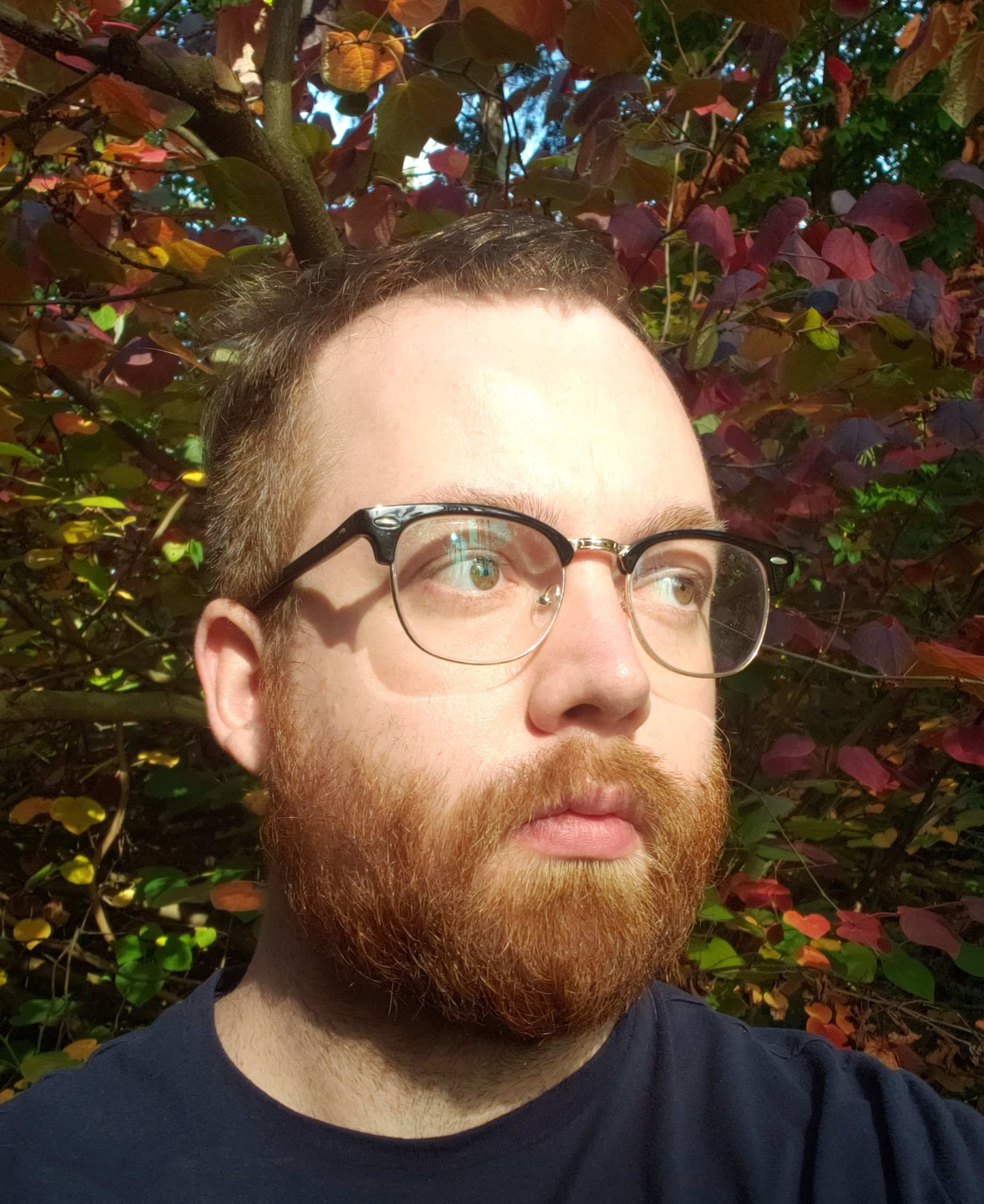Golden Sun is the Best RPG You’ve Never Played
This handheld masterpiece deserves to stand tall beside its role-playing brethren

When you think back fondly on the best RPG machines, a few consoles immediately come up in the conversation: PlayStation, PlayStation 2, Super Nintendo, even the PlayStation 4. When we talk about role-playing games, the discourse is almost always skewed in the direction of our popular mainstays, such as Final Fantasy and Persona. Although RPGs run the gamut of style and substance across every single console, there are still so many genre entries out there that somehow get overlooked by the populace at large. Some of those RPGs are lucky enough to be re-released or remastered, which affords them a brand new audience years after release. Others, sadly, are abandoned on their home consoles, where the options are either emulation or curation.
The Game Boy Advance, interestingly enough, was actually an RPG powerhouse. Final Fantasy I, II, IV, V, and VI all received incredible GBA versions (to this day arguably their best editions), as well as Final Fantasy Tactics Advance, Tactics Ogre: The Knight of Lotus, Mario and Luigi: Superstar Saga, Fire Emblem, Advance Wars, Riviera: The Promised Land…the list goes on.
Advancing the Genre
In August of 2001, Nintendo published a new, unique RPG on their brand new handheld. Camelot Software Planning, known up until then for their Shining Force series of RPGs, took a gamble by attempting to find a brand new audience with the release of Golden Sun. While Camelot had already published Mario Golf and Mario Tennis in the late 1990s, it wouldn’t be until after the release of both Golden Sun and its sequel Golden Sun: The Lost Age that Nintendo would book them for an eternity of Mario sports titles. Looking back at Camelot’s extensive library, Golden Sun feels like a rare blessing, a shining example of what can happen when a studio takes an honest swing at the RPG genre in lieu of simply emulating Final Fantasy yet again.
Golden Sun takes place in a world of magic and monsters, and on its face seems a fairly average RPG entry. You control a party of four heroes who must contend with a world-destroying evil and stop a cataclysm. Your heroes are armed with weapons and magic, they can access powerful summons, and there are plenty of dungeons, puzzles, random battles and turn-based combat. Isaac and his companions travel the world looking for a way to stop the release of alchemy, all the while engaging in side quests as they fight powerful monsters and bosses.
On paper, nothing about Golden Sun sounds novel, but it is the cohesion of all its elements that defines it, the sum of its parts that add up to one of the best role-playing games ever made, and possibly the defining entry in the entire Game Boy Advance library.

Of Djinn and Men
Set in the fictional world of Weyard, Golden Sun’s landscape mirrors our own in many ways, with the slant of the world’s history majorly influenced by its magical source, alchemy. Alchemy in Golden Sun is a little different than how it traditionally shows up in the genre, where instead of it being a manipulation of metals based on alchemical properties it is a force of four elements that control nature. We are introduced to alchemy near its end — after it has been sealed away for its alarming power — long after nations have fallen to it and wars have been waged in its name. Golden Sun’s alchemy can be accessed by people known as adepts, magically-attuned folk who can see the sprite-like djinn and can partner with them to unleash devastating power. The djinn themselves offer a unique flair to exploration, as they can be found anywhere from the world map to dungeons, forcing players to search every nook and cranny of the world for this impactful power.
Golden Sun’s main plot focuses on the use and abuse of alchemy, on the theft of the Elemental Stars and the use of the elemental lighthouses that can restore alchemy to the world and fundamentally change the course of history. This magic, called Psynergy, is an extensive pool of spells that not only benefit the player in combat, but function outside of battles as a means to manipulate physical features in the world and solve puzzles. Psynergy can be used to push and pull objects, freeze things in place, create vines, knock items out of trees, and more. Since Psynergy is attached the djinn that each player character can equip, it’s up to the player to decide what spells to have at any given moment, and how those spells can be used both in combat and in dungeons.
The game’s genius is in its simplicity, in how this default combination of sprite and spell leads to some very unique gameplay elements. Each member of the party in Golden Sun is a naturally attuned adept toward earth, fire, water, and wind. Finding and equipping the proper djinn will make each party member more powerful, granting them new levels of spells and increasing their properties. However, you are free to swap the djinn between party members on a whim, and equipping any character with a djinn not of their natural attunement creates new job classes and new spells. Experimentation is key, but in some cases you can create a much more powerful party if you go beyond the default settings. While mono-element classes are powerful in their own right, experimenting with dual-element and tri-element classes can earn the player not only the best stats in the game, but some very unique spells and summons.
Combat in Golden Sun is fairly traditional, though with one substantial twist. You select commands in the turn-based style of the RPG, though Golden Sun’s streamlined combat and quick animations lead to a very satisfying and action-oriented turn system. What is unique is the use of djinn during battle. Each one of the djinn have their own in-battle properties, and when unleashed can offer bonuses, detriments, deal damage or heal. Once a djinn is used it detaches from that character, to then be used as a powerful summon. The more djinn that are used, the more powerful summons can be unleashed. The trade-off is that once a djinn is used and then placed in a temporary “rest” state, any stat benefits or Psynergy that were granted to the player are temporarily lost. This balance of sacrifice for power and safety keeps each battle — especially the harder boss fights — entertaining and strategic.
Alchemical Design
With music composed by Matoi Sakuraba (known for Star Ocean, Tales of Symphonia, Valkyrie Profile and of course Dark Souls), Golden Sun truly felt as titanic and inspired as any console RPG. Interestingly enough, Golden Sun was originally conceived by Nintendo as a way to compete with what the PlayStation was putting out at the time, so it’s curious how the game ended up on the Game Boy Advance. Despite a change in platforms, there is no denying the scope and feel of Golden Sun, and how to this day it feels like an RPG that belongs shoulder-to-shoulder with the very best that released in the same time period.
Originally conceived as one giant game, Golden Sun and its first sequel The Lost Age were split into two releases for 2001 and 2002, where progress could be continued by transferring save data either via a link cable or an extensive and randomized passcode. While The Lost Age contains a different party (at first), the transferred data comes in handy and adds another layer of power and customization, making the sequel more robust and satisfying than the first Golden Sun. When viewed as one singular game, Golden Sun is a titanic RPG entry that feels almost too ambitious for the Game Boy Advance. The Lost Age also felt ambitious at the time for having you control “the bad guys” for much of the game, offering substantial moral view points for the characters, again another breath of fresh air for a Nintendo property.
Golden Sun actually began its life as a Nintendo 64 game before eventually moving to the Game Boy Advance, which might explain its unique “psuedo-3D” graphical style and the scope of both its narrative and gameplay. While Golden Sun is far removed from its heyday, it was once an incredibly popular, well-reviewed RPG with a healthy fanbase. Before falling into obscurity (only to be revived as Dark Dawn on the Nintendo DS, and to fall away again) it was imagined as a GameCube game, one rumor of many that would sadly never come to pass. Its ambition, like so many ambitious projects, exceeded both what Camelot could do, and what Nintendo was willing to publish.
The Future Is Not Golden
We brought in a Star Wars reference: you have the Empire and you have the Rebels, and if you understand both sides of it, it makes for a more complete story, and that whole type of storytelling methodology we decided they wanted to bring into Golden Sun. You need to understand the motivation behind each individual character’s actions and that sort of thing. And for us, as far as the whole Golden Sun setting, the world, the storyline for us, in our minds, Golden Sun 1 and 2 are prologues to the real event yet to come… So those games are created — again, from our viewpoint — as a way of introducing this world to the game players.
Nintendo World Report
In 2010, Golden Sun: Dark Dawn was released. While it was generally well-received, and fans were excited to have a new game after ten years, it scored lower than both previous entries, sold poorer, and overall felt lackluster compared to what we had on the Game Boy Advance. Sadly, Dark Dawn again left us with a cliffhanger, and over ten years later we have been left without any other sequels or news. Despite the property being a certified and interesting RPG format, Nintendo has declined to do anything else with it.
In 2012, Takahashi responded to fans asking if we may someday get more Golden Sun:
“I’m very pleased that you enjoyed Dark Dawn. RPGs take a very long time to make and need a lot of effort. As you will appreciate if you have played the game, the number of ideas that went into the story was rather substantial. When writing a story like that for a Golden Sun game, I really feel like I am pouring my soul into it and when I am finished, I always feel really drained. Everyone else working on the project also really devoted themselves to it, treating it like their life’s work. So it really is a huge encouragement to us to get a positive reaction from the people who play the game.
A big reason for us making RPGs comes from the requests from all the people who have enjoyed our RPGs in the past. Perhaps if there are enough Nintendo users asking for another game in the Golden Sun series, then this will naturally lead to the development of such a game.”
Video Games Blogger
It seems, despite years of yearning, the demands of fans for more Golden Sun has been answered only with silence, our only nod being Isaac’s inclusion as an assist character in the recent Super Smash Bros.
If it’s possible for you to get your lucky hands on a Golden Sun cartridge, or if you don’t mind emulating Golden Sun and Golden Sun: The Lost Age, you are in for one of the most sublime RPG experiences of your life.
